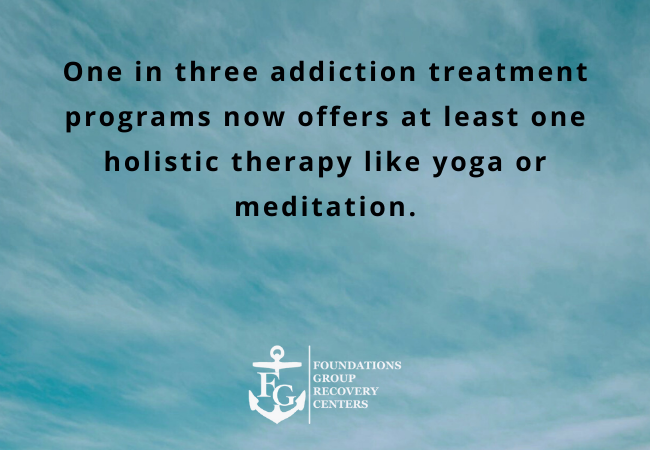In the modern world of addiction recovery, it’s become increasingly clear that treating the addiction alone is not enough. True healing requires addressing the entire individual—body, mind, and spirit. That’s the core philosophy of holistic addiction care, and it’s why Foundations Group Recovery Centers offers a fully integrated Holistic Addiction Treatment Program in Massachusetts designed to support total transformation.
But why does this approach work so well? What makes holistic addiction treatment not just a trend, but a proven, science-backed path to lasting recovery?
In this in-depth article, we’ll break down the neuroscience, physiology, and psychology behind holistic care—and show how modalities like mindfulness, nutrition, movement, and emotional healing complement traditional recovery practices for profound, long-term results.
What Is Holistic Addiction Treatment?
Holistic addiction treatment is a whole-person approach to recovery that combines traditional clinical methods—such as cognitive behavioral therapy (CBT), medication management, and relapse prevention—with evidence-informed complementary therapies. These may include:
- Mindfulness and meditation
- Yoga and movement-based therapy
- Nutritional planning and support
- Art and music therapy
- Acupuncture and massage
- Nature-based and spiritual practices
- Trauma-informed emotional processing
This integrative care model recognizes that addiction is not just a physical disorder—it’s deeply emotional, psychological, and often spiritual. People recovering from substance use need support in every area of their lives to heal, grow, and avoid relapse.
At Foundations Group Recovery Centers, we seamlessly integrate holistic services into our Outpatient Addiction Treatment in Massachusetts, Day Treatment Programs, and Half Day Treatment Program in Massachusetts to ensure accessible, comprehensive support for every individual.
Addiction and the Brain: Why Traditional Treatment Alone Isn’t Enough
Addiction is a chronic brain disorder that rewires how people process reward, manage emotions, and make decisions. Over time, substance use disrupts normal functioning in key areas of the brain:
- Prefrontal cortex – Impulse control and decision-making
- Amygdala – Stress and emotional response
- Hippocampus – Memory and learning
- Nucleus accumbens – Motivation and reward
Traditional therapies help address behaviors and thought patterns, but they don’t always address the physiological and emotional imbalances left behind by addiction. That’s where holistic therapies come in—helping to restore balance across the nervous system, brain chemistry, and emotional state.
Meditation & Mindfulness: Rewiring the Brain for Self-Control
Mindfulness—the practice of staying present and aware without judgment—is one of the most extensively researched holistic practices in addiction recovery. It teaches individuals to observe cravings, triggers, and emotions without reacting impulsively.
Scientific Backing:
- A 2014 study published in JAMA Psychiatry found that Mindfulness-Based Relapse Prevention (MBRP) significantly reduced the likelihood of relapse compared to treatment-as-usual and 12-step programs.
- Mindfulness strengthens the prefrontal cortex, helping with focus, judgment, and impulse control.
- Regular practice decreases activity in the default mode network (DMN), which is associated with rumination and compulsive behavior.
In Practice at Foundations:
In our Addiction Treatment Programs in Massachusetts, mindfulness is a daily tool. Clients engage in guided meditations, breathing exercises, and mindful reflection, particularly in early recovery when cravings and emotional reactivity are at their peak.
Yoga: Restoring Body Awareness and Emotional Regulation
Addiction often creates a mind-body disconnect. Yoga helps individuals reconnect with their bodies in a safe, supportive way—improving emotional regulation, reducing physical tension, and promoting healing from trauma.
The Research:
- A meta-analysis in The Journal of Clinical Psychology found that yoga significantly reduced anxiety, depression, and PTSD symptoms.
- Yoga boosts GABA (gamma-aminobutyric acid) levels in the brain, which helps calm overactive nervous systems—a common symptom in early sobriety.
- Movement and breathwork stimulate the vagus nerve, promoting a parasympathetic (calm) state.
At Foundations:
In our Day Treatment Programs in Massachusetts, yoga is used to help clients:
- Release stored trauma and stress
- Develop healthy coping mechanisms
- Improve sleep, posture, and physical wellness
- Strengthen emotional resilience
Classes are trauma-informed and accessible to beginners, ensuring everyone can benefit from the grounding, calming effects of movement.
Nutrition: Healing the Gut-Brain Axis and Fueling Recovery
Substance use often depletes the body’s essential nutrients, wreaking havoc on digestion, sleep, energy, and mood. Many individuals in early recovery struggle with low motivation, fatigue, and emotional swings—not realizing that poor nutrition is playing a major role.
Science That Supports Nutritional Therapy:
- 90% of serotonin is produced in the gut—not the brain. A healthy digestive system is key to regulating mood.
- Alcohol and drugs can damage the gut lining, reduce nutrient absorption, and lead to inflammation.
- Deficiencies in B vitamins, magnesium, omega-3s, and amino acids are common among those with substance use disorders and are associated with depression and irritability.
Nutrition at Foundations:
In our Holistic Addiction Treatment Program in Massachusetts, clients receive:
- Education on nutrient-dense meal planning
- Hydration strategies and meal support
- Anti-inflammatory food guidance
- Support for healing gut function and balancing blood sugar
Whether someone is attending a Half Day Treatment Program in Massachusetts or continuing recovery after Alcohol & Drug Detox, nutrition plays a pivotal role in rebuilding physical and emotional stability.
Creative Therapies: Unlocking Emotions Beyond Words
Many individuals struggling with addiction have experienced trauma or emotional suppression. Talk therapy is powerful—but it’s not the only way to process deep-seated emotions. That’s where art, music, and expressive therapies shine.
The Research:
- Art therapy improves self-esteem, emotional clarity, and trauma recovery.
- Music therapy reduces anxiety, lowers heart rate, and improves emotional expression.
- Journaling and expressive writing help organize thoughts and identify patterns that lead to substance use.
Foundations’ Approach:
Clients engage in creative therapies as part of our Outpatient Addiction Treatment in Massachusetts, using painting, writing, music, and movement as tools for self-exploration and healing.
Spirituality and Purpose: Rebuilding Identity in Recovery
Addiction often leaves people feeling empty, hopeless, and disconnected. Holistic care helps individuals explore spiritual growth, whether that means reconnecting with a higher power, rediscovering personal values, or building a deeper sense of meaning.
Spirituality has been shown to:
- Reduce relapse risk
- Improve self-worth and motivation
- Foster connection with others
At Foundations, we honor each client’s spiritual path and support their search for purpose in a way that aligns with their beliefs, culture, and values.
Trauma-Informed Care and Nervous System Regulation
Trauma is a root cause for many struggling with substance use. Holistic treatment recognizes this and avoids triggering or overwhelming clients. Practices like breathwork, restorative yoga, EMDR, and polyvagal-informed therapy help calm the nervous system and create a sense of safety.
This is particularly beneficial for clients who:
- Struggle with PTSD or complex trauma
- Have hypervigilance, flashbacks, or anxiety
- Feel emotionally dysregulated or numb
Foundations Group Recovery Centers: Whole-Person Healing in Massachusetts
As a premier Addiction Treatment Center in Massachusetts, we offer more than just detox and talk therapy. We believe in healing the whole self—and our holistic model reflects that.
Our services include:
- Trauma-informed clinical therapy
- Group and individual counseling
- Yoga, meditation, and expressive arts
- Nutrition coaching and wellness planning
- Spiritual and emotional growth programs
- Flexible levels of care: Outpatient, Day, and Half-Day Programs
Whether you’re just completing Alcohol & Drug Detox in Massachusetts or seeking a more mindful, connected path forward, Foundations is here to support your growth.
Conclusion
Holistic addiction treatment isn’t just a supplement to traditional rehab—it’s a transformation of how we heal. By addressing the full spectrum of a person’s needs—emotional, physical, psychological, and spiritual—holistic care lays the groundwork for meaningful, lasting recovery.
At Foundations Group Recovery Centers, we don’t treat people as a diagnosis or a disorder—we meet them as whole human beings ready to reclaim their lives. Whether you’re stepping down from Alcohol & Drug Detox in Massachusetts, seeking balance through a Day Treatment Program, or exploring deeper self-connection in a Half Day Treatment Program, our integrative approach is designed to support you every step of the way. You don’t have to do this alone—and you don’t have to settle for surface-level healing. Call 844.763.4966 today to speak with a compassionate admissions specialist and begin your personalized healing journey.
Frequently Asked Questions (FAQs)
Does holistic treatment replace therapy or medication?
No. Holistic care complements evidence-based treatment methods to create a stronger, more sustainable recovery experience.
Is holistic care only available in inpatient rehab?
Not at all. We offer holistic services in all levels of care, including our Outpatient Addiction Treatment in Massachusetts and Day Treatment Programs.
What if I’m not spiritual or have physical limitations?
Holistic care is highly individualized. All practices are adapted to your comfort level and interests.
Do I need to complete detox before starting holistic care?
Yes, if you’re physically dependent. After completing Alcohol & Drug Detox, you can safely begin integrated recovery with holistic support.
How do I know if holistic treatment is right for me?
If you’re seeking emotional growth, physical healing, stress reduction, and lifelong tools for wellness, holistic care is an ideal fit.


